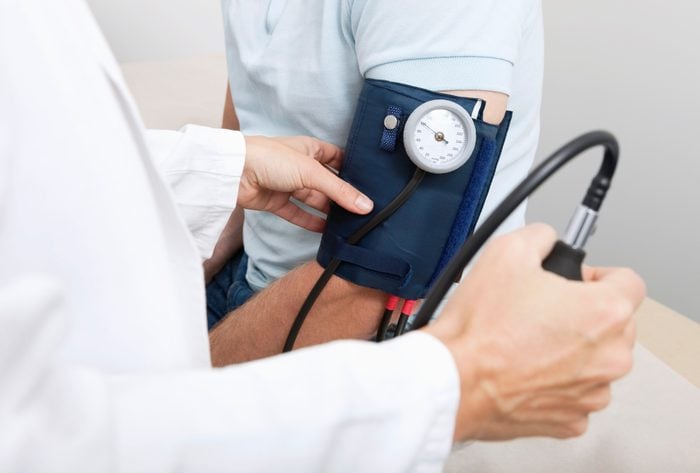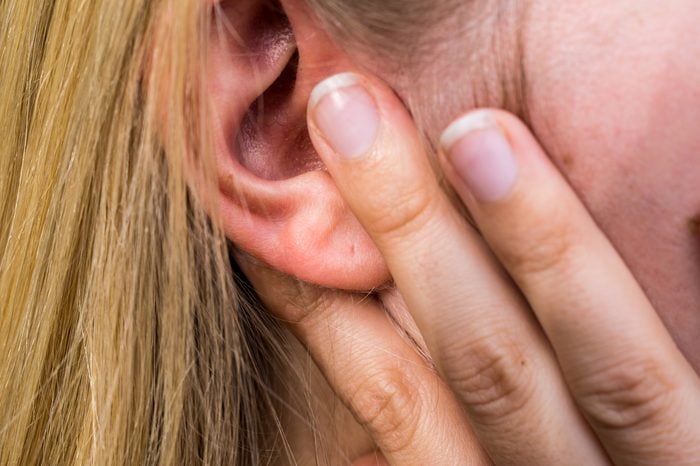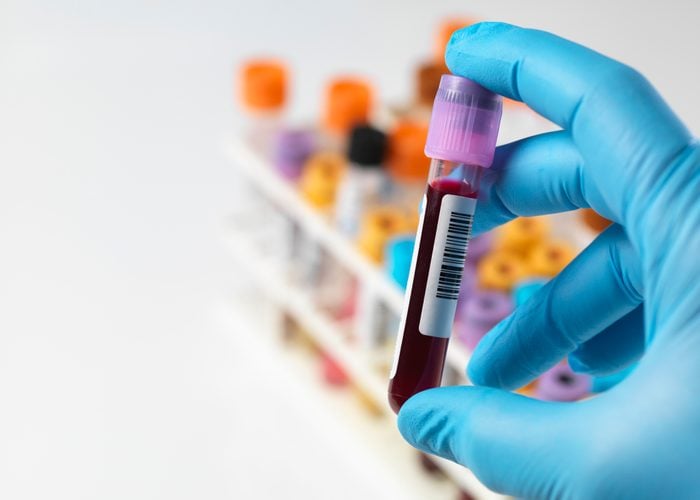Why the world spins
Everyone feels dizzy once in a while. Maybe the world spins for a few brief seconds because you got up too quickly or perhaps you had an intense workout and didn’t hydrate. There are also more serious or chronic causes for that unsteady feeling that can grip your mind. Here are a few of the more common conditions that can cause dizziness, and some possible solutions and treatments that can help make the world stop spinning.

Low blood pressure
Hypotension—otherwise known as abnormally low blood pressure—can make you feel lightheaded, particularly when going from lying down to sitting or standing. You can have abnormally low blood pressure for many reasons such as pregnancy, infection, a severe allergic reaction, or medication. For example, if you have high blood pressure and are taking medication, you can end up with pressure that is too low if the dosage is incorrect.
That said, there is something called orthostatic hypotension, a common problem where blood pressure drops temporarily when you go from a horizontal to vertical position, triggering dizziness. “When you get up too quickly from a seated or lying position and your blood doesn’t travel as quickly up to your head, you can experience a ‘head rush’ feeling,” says Sherry A. Ross, MD, women’s health expert and author of She-ology: the she-quel. To avoid the head rush, take your time when changing body positions. Also, talk to your doctor about possible issues with your circulation, medication, or other health conditions. (Here’s a list of home remedies for low blood pressure you can try.)

Dehydration
Keeping your body hydrated makes it easier for your heart to pump blood through your blood vessels, helping your muscles to work more efficiently. Not surprisingly, a lack of proper hydration can cause blood pressure to drop quickly which, in turn, can cause dizziness, according to the American Heart Association. “A blood pressure reading reflects the force or pressure exerted by circulating blood on the walls of the arteries and veins,” says Dr. Ross. “When you are dehydrated, there is less fluid and less volume in your body causing your blood pressure to drop since there is less force being exerted.”
The good news? You have to be truly dehydrated to experience this sort of dizziness. “Being a little dehydrated doesn’t cause dizziness unless blood pressure is on the low end to start with,” says neurotologist and neurologist Dhasakumar Navaratnam, MD, PhD, associate professor of neurology and of neuroscience at Yale School of Medicine.
How much water should you consume to avoid any level of dehydration? If you perspire heavily, you’ll need to drink more than someone who doesn’t. Certain medical conditions, such as diabetes or heart disease, may also require you to drink up. Same goes for medications that act as diuretics, causing the body to lose more fluid. The easiest way to know if you’re dehydrated: Pay attention to the color of your urine. If it’s pale, you’re well hydrated; if it’s dark, you need to drink more fluids. (And keep in mind that it’s also possible to drink too much water.)

Caffeine overdose
Taking in more than the recommended daily amount of caffeine can lead to dizziness. That’s because “caffeine is basically a stimulating drug, plain and simple,” says Dr. Ross. “A healthy and recommended dose of caffeine is 250 milligrams per day, although some say up to 400 milligrams, which is equal to three 8-ounce cups of coffee.” Keep in mind, caffeinated drinks also act as a diuretic, raising your risk for dehydration. A study published in Frontiers in Nutrition found that participants who drank more than 537 milligrams of coffee were at greater risk for dehydration than those who drank about half that amount.

Hyperventilation
Hyperventilation is rapid or deep breathing, usually caused by anxiety or panic. This “overbreathing,” as hyperventilation is sometimes called, may actually leave you feeling breathless. A study, published in PLoS One, looked at more than 600 patients admitted to the emergency room of a large university hospital who were diagnosed with hyperventilation and found that the condition is often associated with fear, tingling—and dizziness.
“With panic and anxiety you hyperventilate a little and when you do, you reduce the amount of carbon dioxide in your blood, which makes the pH of your blood a little higher than normal,” explains Dr. Navaratnam. “The brain is sensitive to that and [as a result] the blood vessels constrict. So less blood is made available and that manifests as a sense of dizziness.”

Concussion
If you’ve hit your head on something recently—even just a kitchen cabinet—dizziness is a sign that you could have a concussion. “Most concussions are mild, but they all cause some injury to the brain and must be evaluated by an expert trained in recognizing them and treating them accordingly, in a timely manner,” says Vernon Williams, MD, neurologist and founding director of the Center for Sports Neurology and Pain Medicine at Cedars-Sinai Kerlan-Jobe Institute, in Los Angeles. “It can take a few hours, or even up to a few weeks, to recover from a concussion.”

Inner ear infection
“You wake up feeling somewhat dizzy, you’ve lost hearing on one side, you’re a little nauseous, and you’ve got mild vertigo,” says Dr. Navaratnam. “As the day goes on, you feel worse. Six or seven hours later, you’re retching all over place.” It’s likely you have what’s known as labyrinthitis, or inflammation of the inner ear, which is usually triggered by an infection such as a cold or flu. Diagnosing labyrinthitis is challenging because these symptoms are common in a number of other conditions. “If you have labyrinthitis, it usually gets better on its own,” says Dr. Navaratnam. “Steroids can speed up the process.”

Thiamine deficiency
Thiamine (aka vitamin B1) is an essential micronutrient that helps maintain the central nervous system. Thiamine deficiencies can lead to feelings of weakness (because the body isn’t properly processing fuel into energy) and irregular heartbeat, as the nervous system is depressed. Over time, a B1 deficiency can lead to cardiomyopathy, or enlarged heart, which then interferes with blood flow to the brain. “Thiamine is an important vitamin for cell energy and muscle functioning,” says Dr. Ross. “Since the heart is basically one big muscle, a thiamine deficiency can cause a very slow and abnormal heart rate that creates dizziness, fatigue, and fainting.”
Worldwide, thiamine deficiency is usually caused by inadequate intake of thiamine-rich foods, according to a review of studies published in Annals of the New York Academy of Sciences. But in the United States, where diets include plenty of thiamine-rich whole grains, meats, legumes, and nuts, and fortified cereals and flour, thiamine deficiencies are more commonly seen in people suffering from alcoholism or chronic illness, according to a 2019 report in StatPearls. Thiamine is also available in multivitamin/multimineral supplements.

Anemia
Named after the Greek word for “lack of blood,” anemia is a condition that develops when you don’t have enough healthy red blood cells. That means your blood doesn’t carry enough oxygen throughout your body. If you’re anemic, as many women are during their periods, you feel tired and weak. You also may have shortness of breath, headaches, an irregular heartbeat, and dizziness, according to the National Heart, Lung, and Blood Institute.
“The body is a carefully constructed machine,” says Jennifer Wider, MD, women’s health expert and author of The Savvy Woman Patient. “The vital organs like the brain and heart require consistent blood flow to supply them with oxygen and nutrients. Other organs and systems of the body—like the intestines and muscles—will call for more blood flow only when they need it; for example, after a large meal or during exercise. When there’s enough blood and oxygen to go around, this isn’t an issue. But if someone is anemic, there aren’t enough healthy red blood cells to go around. When the demand for oxygen from other organs goes up, there may be a temporary reduction of oxygen to the brain and the result can be dizziness.”
There are different types of anemia—including pernicious, aplastic, hemolytic, and iron deficiency anemia—and each has its own cause. Iron deficiency is the most common cause, accounting for about half of all cases worldwide. “For mild to moderate cases, the treatment usually consists of iron supplements and a change in diet,” says Dr. Wider. For severe cases, “the treatment could involve locating the source and potentially surgery to stop the loss of blood.”
Next up, 15 scary-seeming symptoms that are actually harmless.
